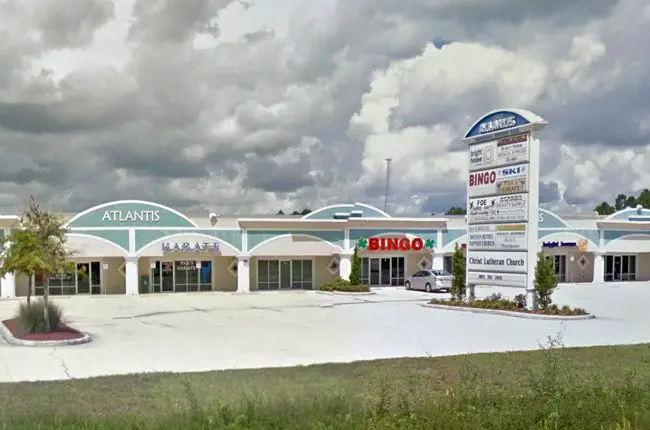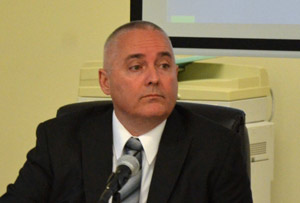
A year ago this week, Bunnell Police Chief Tom Foster, accompanied by two Florida Department of Law Enforcement agents, two Bunnell police officers and a deputy from the Seminole County Sheriff’s Office conducted an overt inspection of Shamrock Bingo on State Street in Bunnell. There, they saw some 40 operational which could take “bets” of between a quarter and a dollar through eight different types of games.
One of the special agents concluded that the business was operating slot machines in violation of state law, according to a report of the investigation, and that the games were “an illegal lottery.” The business was run by Harold Irwin of Palm Coast. Foster did not arrest Irwin but eventually sent him a cease and desist letter, essentially shutting down the operation.
That had been the bingo operation that had been sustaining Flagler Cats, the Bunnell non-profit owned by Mari Molina. As a result, the organization “has lost the bulk of its revenue,” according to a lawyer’s letter to the city.
Irwin and Irwin’s attorneys, Michael Chiumento III and Vincent Lyon of Palm Coast’s Chiumento Selis Dwyer, argued to the city attorney that Shamrock Bingo had been operating without issues since 2012, when the business approached the late Arthur Jones, who was then Bunnell’s police chief (he died in 2013). Jones, according to a Jan. 19 letter Lyons wrote the Bunnell City Commission and its attorney, “verbally approved the operation,” and the business continued to operate after it was demonstrated to the two subsequent police chiefs: Jeff Hoffman and Foster himself.
“And in 2015 the City Attorney investigated the operation for allegations of being a gambling hall,” the letter goes on. “Each of them said he was satisfied with what he saw and Flagler Cats was allowed to keep operating.”
City Attorney Wade Vose, in a May 2 memo, “strenuously” disputed many of the claims and conclusions in the Lyon letter, including the letter’s assertion that the city attorney had green-lighted the operation with the electronic devices. “Nothing could be further from the truth, and it is surprising that such an assertion would be made in a correspondence also addressed to me,” Vose wrote. “The only information the City Attorney was ever provided in 2015 by Chiumento Selis Dwyer concerning bingo operations in Bunnell was information relating to live-called bingo and paper pull tab instant bingo, and not to electronic instant bingo or ‘instant bingo machines.’ In fact, Chiumento Selis Dwyer never disclosed to the City Attorney the existence of electronic instant bingo or ‘instant bingo machines’ at any of their clients’ facilities in Bunnell until around the time of Chief Foster’s 2016 inspection.’”
The heart of the dispute is over the definition of bingo: Florida law clearly allows it. It’s played in just about any assisted living facility, in veterans’ halls and at other club-like organizations. The question becomes hazier to answer when the game involved goes beyond its simple call-out version involving paper ballots.
The conflict in Bunnell echoes to some extent the brief conflict in Flagler Beach almost seven years ago when the local chapter of the Disabled American Veterans organization sought tom have penny-ante electronic gambling machines installed, as a fund-raiser for the non-profit organization. The city voted against the proposal, citing an ordinance that explicitly forbids commercial activities in residential areas. In that case, the city had an ordinance to fall back on.
“Without an ordinance, we don’t know why we don’t comply, and we can’t demonstrate to anybody that we do comply.”
Lyon argues not only that Bunnell has no such ordinance, but that the Bunnell police chief “was over-extending his authority, because the City has not established any rules or ordinances to deal with this specific fundraising activity.” That’s true: Bunnell has no such ordinance, but Lyon was also essentially making the startling claim that Foster could not act under state law’s authority: “More to the point,” Lyon specified, “we disagree with his authority to interpret the law on his own.”
The claim left Vose incredulous: “This unfounded assertion runs entirely contrary to the role of law enforcement officers and the authority vested in a Bunnell police officer under Florida law.” (In an appearance before the Bunnell City Commission last week, Chiumento took a more nuanced approach, saying the interpretation by the city attorney that any electronic bingo machines was impermissible under state law did not match up with the law’s wording, however ambiguous that wording. He also conceded that in the end, it would be a policy decision by the commission.)
Chiumento and Lyon met with Vose and City Manager Dan Davis on Nov. 2 at Chiumento’s request to determine how Irwin, the business owner, could resume his bingo operations. But the meeting didn’t resolve the matter: the city maintained that call-out bingo was fine, but not so electronic-machine, instant bingo.
So Chiumento and Lyon drafted a proposed ordinance they felt would address the issue raised by the city. “We just ask that the city allow Flagler Cats to resume operations with reassurance that the Chief of Police will not interfered again,” Lyon wrote, provided they keep within the terms of the proposed ordinance.”
That proposal went to the city commission last week, but with the same recommendation from the city attorney and the administration: don’t approve it “as currently drafted.” (The proposed ordinance is in the embedded attachment below.)
“We need your help drafting some type of policy, some type of rule or some type of ordinance to give us guidance,” Chiumento told the commission, asserting that Shamrock Bingo had been operating as a gaming parlor since 2004, but changed its offerings after the Legislature forbade sweepstakes-like Internet cafés. “We complied with that,” he said.
“But without an ordinance or without any mechanism within your community,” Chiumento said, “we don’t know why we don’t comply, and we can’t demonstrate to anybody that we do comply.” He was not interested in rehashing the outcome of the investigation, but in coming up with the mechanism that would shed clarity in Bunnell regarding that sort of business. Conceding the complexity in state law, the options he suggested were to either to have the city write an ordinance—if it would not consider his own—or ask for an attorney general’s opinion on the matter.

Commissioner Elbert Tucker recommended that the commission seek an attorney general’s opinion “as to the validity and legality” of the machines, and whether the proposed ordinance is in conflict with state law. He did tip his hand to some extent, however: “I’m going to lean on the experience of the FDLE, as opposed to me or your opinion or anybody else’s, other than perhaps the state attorney general’s office,” Tucker said. “Special agents are not to be taken lightly.”
Commissioner Bill Baxley was satisfied with Vose’s and Foster’s findings: he was not interested in taking the issue further. The fact that it’s a game of chance, as Irwin—the business owner, confirmed—also had commissioners leaning more against the machines that in favor. But games of chance like bingo are not necessarily illegal, of course. “It’s a relevant factor, it’s not a determining factor,” Vose said.
“Whether the attorney general likes it or not, I would oppose it,” Sowell said, stressing that the games, unlike their paper version, are quick and encourage quicker monetary losses that drawn-out paper games.
Even if the attorney general finds the machines legal, the city would not necessarily be under obligation to allow the machines, Vose said. But he cautioned that there’s not complete clarity on whether state law grants the city that discretion.
The commission agreed 3-1 (with Baxley opposed and Mayor Catherine Robinson absent) to seek out the attorney general’s opinion, pending receipt by month’s end from Chiumento’s office of a more detailed rationale for electronic bingo’s legality.
![]()
Bunnell Bingo Background, Investigation and Proposed Ordinance (2017)
Click to access bunnell-bing-ordinance-background.pdf





























Lazaruis says
I thought these instant electronic “bingo ” machines were outlawed years ago . Gambling is gambling no matter what percentage goes to a charity .
This sounds very much like the red light camera tickets that has everyone upset , this too gives a donation of small proportions to the law enforcement agencies.
Both should have clear mandates to close them down .
John dolan says
Great job Elliot Ness. Another vacancy in a Strip mall barely hanging on as it is. Who loses? The landlord, the employees and the poor kitties.Also the patrons who now have to look for another place to fratranize. God Bless America and BunnellPD.
Lazaruis says
John
Why not open a casino and allow prostitution ?
That would create a lot more jobs too.?
That gambling hall should have been closed along time ago !!
Ben Dover says
this was plain and simple a gambling parlour.. and the small amout of money given to the cat fund was a joke compared to the amount of money the owners collected, mostly tax free/evaded dollars..stop this nonsense about it is only a little money!! its huge!! wake up!!
USA Lover says
The Florida Lottery is also gambling. You can’t legislate morality. Pick your poison.
John dolan says
Yes Lazarius why not? It’s legal in Nevada.
Vincent says
To Ben,
Florida law requires all profits go to the charity in question and the vendors, landlord, etc. are prohibited from charging anything above market rates. The income to the vendors is, of course, taxed.
Toni Soprano says
Um, doesn’t EVERY church have bingo?